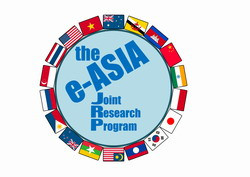The e-Asia programme was initiated by the Japan Science and Technology Agency (JST) and is currently the only opportunity that enables direct engagement and science collaborations to develop within the South Asian region via a multilateral forum. The programme also provides the opportunity for developing further relationships with key partners in the region, such as Japan, Australia and the US, and enhances New Zealand’s status as a collaborator and mentor.
The HRC has become a respected and valued voice amongst the member organisations. Research that the HRC has funded to date, led by Professors Gregory Cook and John Crump from the University of Otago, discovered that most of the drugs currently used to treat multidrug-resistant Tuberculosis (TB) in Myanmar are ineffective. The result of these findings has been unprecedented interaction with Myanmar Government officials and policymakers and the introduction of new TB diagnostic methods and drugs for the treatment of critically-ill drug-resistant TB patients.
New Zealand has provided cutting-edge technical support to facilitate evidence-based healthcare policymaking in Myanmar. In turn, this has benefited New Zealand’s approach to engaging in global health issues and placed New Zealand in a strong strategic position to further strengthen our investment and economic ties with South East Asian countries.
The experience in Myanmar has led to researchers collaborating with the NZ Tuberculosis Reference Laboratory to incorporate next-generation whole-genome sequencing into the routine diagnosis of drug-resistant TB in New Zealand.
Approximately 30% of total TB cases in New Zealand are from cases born in the South East Asia region. The scientific collaboration with major centres of health education and research in South East Asia, puts New Zealand researchers in a position to identify strategies to mitigate health security threats related to major infectious disease, and is building strong scientific partnerships for addressing other regional public health emergencies that cannot be effectively studied within New Zealand alone.
This e-Asia collaborative work builds scale and capacity for advanced molecular techniques to address the global health issue of antimicrobial resistance and maintains our ability to retain world-class New Zealand researchers with expertise in infectious diseases, medical microbiology, epidemiology and global health in New Zealand.
One such researcher is Dr Htin Lin Aung, a Myanmar-born researcher at the University of Otago, who was awarded a New Zealand ASEAN award by the New Zealand Government in recognition of his commitment to strengthening the bilateral relationship between Myanmar and New Zealand. Dr Aung is now undertaking an HRC Sir Charles Hercus Fellowship to further build on the foundations laid by the e-Asia research collaboration.
The research leadership and expertise grown within the e-Asia programme has been further recognised internationally with New Zealand researchers finding success with major international grants off the back of HRC-funded e-Asia research. Professor John Crump is now helping lead an NZD$18 million international project, believed to be the largest of its kind, funded by the UK Department for International Development, to tackle antimicrobial resistance and develop a blueprint for treatment of drug-resistant fever in sub-Saharan Africa and South East Asia.
Professor Crump credits the HRC-funded e-Asia work as essential to building and maintaining major and critical partnerships for securing such on-going global health research collaborations.
